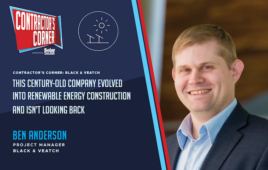Houston may be big oil’s U.S. headquarters, but some of the city’s 2.3 million residents (the fourth largest city in the United States) are still interested in green energy. A supportive local government with an expedited solar permitting process has helped Adaptive Solar promote clean energy in the community. But cheap oil doesn’t make things easy.
 “Houston is a tough market because it’s super-cheap electricity,” said Adaptive Solar founder Richard Sherwood. “Electricity is often 8 to 9 cents per kWh in the residential market, and we have no incentives—it’s just the federal tax credit. On the commercial side it can be as low as 3 or 4 cents per kWh. It’s tough.”
“Houston is a tough market because it’s super-cheap electricity,” said Adaptive Solar founder Richard Sherwood. “Electricity is often 8 to 9 cents per kWh in the residential market, and we have no incentives—it’s just the federal tax credit. On the commercial side it can be as low as 3 or 4 cents per kWh. It’s tough.”
Why even get involved with solar in Houston? Adaptive Solar formed in 2010 after a solar distributor opened in the area and had a pipeline of 100 new Lennar-branded home builds with solar. Sherwood said it made sense to dive into the solar industry with 100 guaranteed projects. Seven years later, Adaptive’s 15 full-time employees have installed on more than 500 homes and completed a dozen or so commercial projects. Sherwood said the team’s retail focus and customer-first approach to business helps build the solar brand in oil country.
“Houston is tough with the low rates and no incentives,” Sherwood said. “In California, it can be an ‘all-head’ decision. In Houston, it’s ‘head and heart.’ The retail [view of business] that we have is that we’re the company that’s been here, we’re going to stick with you. We know that the customer is first.”
 Although in the business for seven years, Sherwood said solar in Houston still feels very new.
Although in the business for seven years, Sherwood said solar in Houston still feels very new.
“Educating the customer in Houston is still a big deal,” Sherwood said. “People really only want to buy solar if they can see savings in month one. I would like to see people really take a longer view about solar. Looking at the lifetime of a system, you are saving a lot of money.”
Since the historic flooding Houston experienced after Hurricane Harvey in August 2017, Adaptive Solar has seen more interest in solar, but with backup power.
“Living on the Gulf Coast, power outages are always a concern,” Sherwood said. “A lot of people look for solar wrongfully as backup power. I was bracing for the worst; I didn’t think anyone would be looking at solar for the next three months. [The hurricane] has piqued interest, and we’re seeing a lot more leads but almost exclusively with the battery backup right now.”
 Adaptive Solar’s big focus on marketing and building a respected brand has made Sherwood interested in forming a co-op of sorts, to help local installers buy product, develop software and leverage big data.
Adaptive Solar’s big focus on marketing and building a respected brand has made Sherwood interested in forming a co-op of sorts, to help local installers buy product, develop software and leverage big data.
“As a local installer, I have battled with Google—SEO, AdWords—trying to figure out marketing methods. It seems like I’m spending less time thinking about solar and more just in marketing,” he said. “Our idea is to get some of these local installers together to create all those efficiencies that large companies see. I think once SolarCity/Tesla Solar cleans up their act, it’s going to be a more formidable opponent than what people thought. We all need to be working together to build that case to buy solar locally.”
Even with the difficulties, Sherwood said he enjoys being part of the “solar tribe” and bringing in more members.
“In Houston, it’s easier to make money in oil and gas,” Sherwood said. “It takes a special kind of person in Houston with our cheap electric prices to really want to go solar. There has to be that heart there.”





This is awesome news. I think this could be a new use-case for solar should extreme weather spread everywhere around the country, raising the risk of brownouts or blackouts. This is also a great experiment – building a tiny backup solar + battery system with parts off Amazon: http://sunboxlabs.com/2017/10/09/hurricane.html. Currently $230!